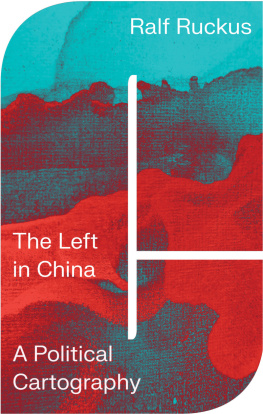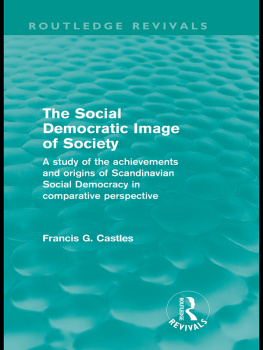Social Democracy
The Social Democratic party family is a central part of political life in the West. This book focuses on this party family as well as a unique political force in the industrialised world. It provides a critical comparative survey of when, where, how and why Social Democracy developed within established capitalist democracies.
The book explains the electoral fortunes of Social Democratic parties, the influence of the party system dynamics and co-operation between parties in government. It examines the ideological tensions within Social Democratic parties between socialists and reformists and its ramifications for pursuing a better and kinder world. This study also discusses the recent state of affairs and its mission in the 21st century. The book features a comparative analysis of 21 cases from Australia, Austria, Belgium, Canada, Denmark, Finland, France, Germany, Greece, Ireland, Italy, Japan, Netherlands, New Zealand, Norway, Portugal, Spain, Sweden, Switzerland, the UK and the United States.
It will be of key interest to students and scholars of public policy, comparative politics, party politics and democracy studies.
Hans Keman is Professor Emeritus of Comparative Political Science at the VU University Amsterdam, Netherlands. He is a former editor of the European Journal of Political Research and of Acta Politica.
In this wide-ranging and thoughtful book, Hans Keman exploits an unrivalled knowledge of Social Democratic parties in 21 countries and their history to explain why this party family is in trouble. It is required reading for those who, like the author, really care about the answer.
Chris Pierson , University of Nottingham, UK
This book is a wise and deeply grounded analysis of the development of Social Democracy from its origins to the present. Hans Keman is a master at combining historical and statistical analysis, and in this book he draws on decades of research to make an immensely ambitious, wide-ranging and valuable contribution to our understanding of Social Democracy.
Gary Marks , University of North Carolina at Chapel Hill, USA
This is an impressive and encompassing collection of profound applications of all the relevant methods in comparative politics, in particular analyzing Social Democracy. This book resembles many of the most prominent European scholars in the field during the last three decades. A must read for each ambitious student in comparative politics and beyond.
Wolfgang Merkel , Humboldt University and Science Center Berlin, Germany
For long a favoured research topic, Social Democracy has been comparatively neglected in the last two decades. This masterwork by the doyen of scholars of Social Democracy fills that gap by providing a convincing systematic explanation of the rise and decline of the family of Social Democratic parties. Kemans book demonstrates that this development and a further decline would have far reaching implications.
William Paterson , OBE, FRSE, Birmingham University, UK
Grounded in his career-long rigorous research on why and how Social Democratic parties differ in their organization, policies and performance, Hans Keman has written the most informative and challenging account of Social Democracy available. By carefully tracing and comparing the histories of the parties, Keman brilliantly exposes their main achievements, mistakes, successes and failures.
Kees van Kersbergen , Aarhus University, Denmark
First published 2017
by Routledge
2 Park Square, Milton Park, Abingdon, Oxon OX14 4RN
and by Routledge
711 Third Avenue, New York, NY 10017
Routledge is an imprint of the Taylor & Francis Group, an informa business
2017 Hans Keman
The right of Hans Keman to be identified as author of this work has been asserted by him in accordance with sections 77 and 78 of the Copyright, Designs and Patents Act 1988.
All rights reserved. No part of this book may be reprinted or reproduced or utilised in any form or by any electronic, mechanical, or other means, now known or hereafter invented, including photocopying and recording, or in any information storage or retrieval system, without permission in writing from the publishers.
Trademark notice : Product or corporate names may be trademarks or registered trademarks, and are used only for identification and explanation without intent to infringe.
British Library Cataloguing-in-Publication Data
A catalogue record for this book is available from the British Library
Library of Congress Cataloging-in-Publication Data
A catalog record for this book has been requested
ISBN: 978-0-415-57406-8 (hbk)
ISBN: 978-0-415-57407-5 (pbk)
ISBN: 978-1-315-16624-7 (ebk)
Typeset in Bembo
by Apex CoVantage, LLC
Ever since the time I read as a student political science and contemporary history I have been fascinated by political change and how this would affect the fabric of society. Change, so I thought, was brought about by human action and was more than less intended to make society a better place for everyone. This kind of voluntarism (or wishful thinking) may have been nave. I still hold that homo politicus is crucial for understanding political and socio-economic change in contemporary society.
Yet maturing into an academic career also signified that I became aware of the complexities and limitations of human action. In particular fundamentally changing society towards a different direction appeared quite complicated: evidently there is a bigger gap between dream and reality than political actions and ideas can close by means of good intentions alone. Hence, there is always a need for solid and thorough analysis of how to change society into a better, kinder and gentler direction (cf. Arend Lijphart). This is what I intend to do with this book, in which the agent of political action is Social Democracy and (representative) democracy the systemic context for analysing the room for manoeuver of political action.
Why Social Democracy, one may ask? First, this has had to do with my upbringing (in the 1950s and early 1960s) on the one hand and the Zeitgeist of my time as a student (late 1960s) on the other hand. Second, in 1973, the leader of the Dutch Social Democracy, Joop den Uyl, became prime minister of the most ambitious post-war coalition ever in ideas on modernising society by means of policy change. At the same time Social Democracy was in power in a number of other European countries, and fundamental change was the imminent project on the agenda. This concerned mainly the development and achievement of the welfare state. Although progress was made, the eventual societal change was less lasting than expected. This was the subject of my doctoral dissertation.
Since that time one of my central research questions has been to what extent are political parties capable of bringing about desired change, and under what conditions and circumstances is their policy performance, to say the least, optimal and beneficial? This book bears therefore the fruit of my comparative research efforts over the years. My development as a comparative political scientist has been blessed by international cooperation in many different research projects. This also signified that my ideas regarding political action and contextual factors have been altered by discussing approaches and explanations. I am now much closer to what Fritz Scharpf once coined as rational institutionalism, in which human agents are still central but ought to be understood ontologically as also directed by institutions, conventions and context.












